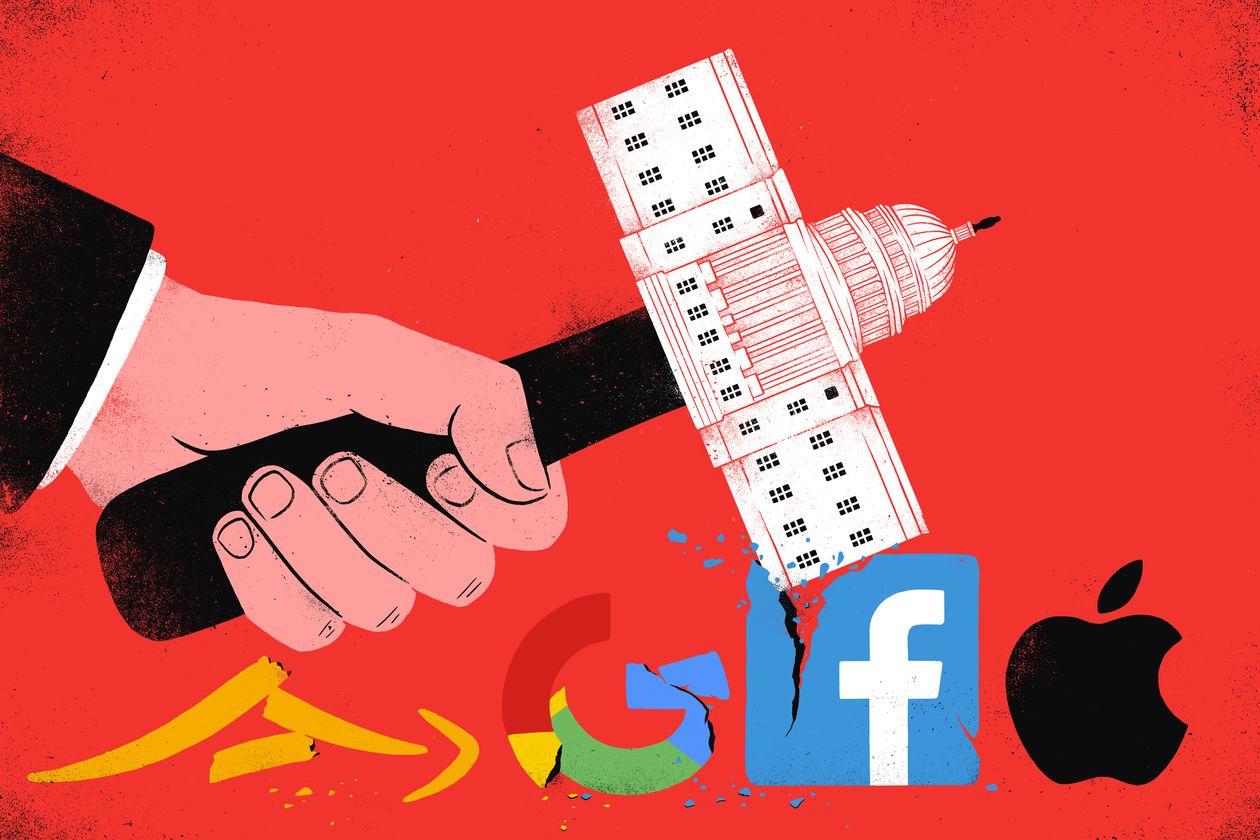Four tech giants have been consolidating wealth and media control over the past several years, and especially during the pandemic. Amazon, Facebook, Apple, and Google have cemented their platforms in businesses from social media to movies as critics argue their practices harm consumers and online information. After a 16-month investigation completed last fall by the Democratic members of the House Judiciary Subcommittee on Antitrust, House lawmakers in June introduced six antitrust bills intended to curb the power of these companies to acquire or undercut competitors.
The Judiciary Committee advanced the bills on June 24, following a debate and vote that spanned two days and showed divisions among lawmakers. Democrats overwhelmingly support the proposals alongside a handful of Republicans, who claim social media companies censor conservative voices. In the Senate, the bills will each require significant Republican support to attain the 60 votes needed to override the legislative filibuster.
On June 28, a federal judge dismissed federal and state antitrust lawsuits against Facebook, saying the Federal Trade Commission hadn’t supported its claims that Facebook holds a dominant market share and that the states waited too many years to make their case. The rulings were followed by renewed calls for Congress to give regulators more legal tools to take on tech firms.
Seattle Congresswoman Pramila Jayapal, a Democrat, is sponsoring one such bill, the Ending Platform Monopolies Act, with support from Texas Republican Rep. Lance Gooden. This proposal would allow the government to sue the Big Four to remove business lines deemed a “conflict of interest,” such as Amazon’s marketplace running for third-party sellers while competing with its own products. The other tech firms would face similar restrictions, alongside massive daily fines for noncompliance.
The American Innovation and Choice Online Act would ban “self-preferencing and picking winners and losers online,” making it illegal for a company to sell a service to access its platform—like how Google requires the use of its own ad products for its advertisers.
Obviously, these proposals don’t sit well with the lobbying organizations funded by these tech firms, such as the Chamber of Progress, a “center-left” tech policy trade group partnered with Amazon, Facebook, and Google, or The Consumer Technology Association, which maintains a similar member list.
On June 21, a coalition of 13 think tanks and advocacy groups wrote an open letter to the U.S. House Judiciary Committee, warning that these two bills would “dramatically degrade” or break devices and services owned by Big Tech. The letter failed to mention that each organization that signed is in some way funded by the companies under scrutiny.
According to the report by the House Judiciary Subcommittee on Antitrust, the Big Four exhibit a range of anticompetitive behavior that must be met by bolstered antitrust laws to allow for more competition in the U.S. internet economy. As it stands, Amazon’s market strips sellers’ ability to negotiate; Facebook’s monopoly power crushes competitors like Instagram; Google pushes its “inferior” content over specialized search engines; and Apple excludes competitors from its tightly controlled app store.
Further, the companies control access to online information in potentially harmful ways. In January, Google threatened to shut down its search engine in Australia as lawmakers pushed the company to pay for the news stories it displays. This spring, Amazon levied its influence in the news and social media to divert attention from its workers’ grueling conditions. In attempting to shape news, the company has also lied to and manipulated reporters.
A September 2020 survey from Pew Research showed that 36% of adults regularly received news from Facebook. The platform distributes stories from other sources through its newsfeed, which informs what millions of Americans know about their country and the world. The most successful news site on Facebook is The Daily Wire, founded by right-wing pundit Ben Shapiro. A review by Popular Info showed the site’s top stories in a period from May 18 to June 18 were mostly aggregations of other news reports, often by local outlets, that were given an “inaccurate or incendiary spin.”
Run by a few dozen employees and producing little original reporting, The Daily Wire dominates in Facebook engagements, averaging 48,027 per story against The New York Times’ average of 2,663 in May. That is to say: a site known for conspiracy theories is the most successful news source on a platform frequented by over a third of American adults. It follows that dangerous misinformation can flourish. During a pandemic, when vaccines and masks drastically raise rates of survival, this scale of deception can be deadly.
A recent paper published in the science journal PNAS calls for the study of tech’s impacts as a “crisis discipline”—a field in which scientists work across disciplines to address an urgent societal issue, such as global warming. It argues that our lack of understanding of the collective behavioral effects of new technology poses a threat to democracy and science. The paper further notes how tech companies “fumbled their way through the ongoing coronavirus pandemic, unable to stem the ‘infodemic’ of misinformation” that has hindered widespread acceptance of masks and vaccines.
Carl Bergstrom, co-author of the paper and biology professor at the University of Washington, describes how individuals may promote healthy ideas online, “but if the net influence on social media is to promote anti-vaccination sentiment in the United States to the point that we’re not going to be able to reach herd immunity, it doesn’t let social media off the hook.”
Facebook professes support for local news while privileging falsehoods and Amazon outright bullies reporters who cover its advertising; both companies, with Apple and Google, stifle competitions and accrue massive wealth amid a pandemic. Efforts to regulate Big Tech, alongside the study of its effects, must persist to foster a healthier market and information ecosystem online.
Illustration by Sébastien Thibault / Barron’s

